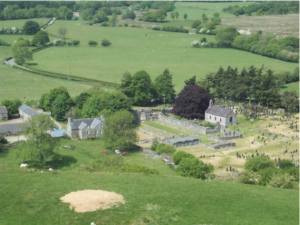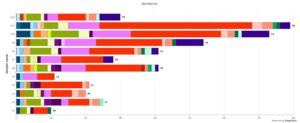Several new sets of resources have been recently added to the Catalogue bringing the total number of available resources in the ARIADNE Catalogue to just under 4 million and increasing its geographical coverage.

Looking down at the ruins of Strata Florida Abbey, from the hillside to the southeast. Dyfed Archaeological Trust.
The Royal Commission on the Ancient and Historical Monuments of Wales (RCAHMW), has supplied 118,454 records for sites and monuments in Wales, which completes the coverage of the UK. Over 8,000 of these are maritime sites, the remainder being sites and monuments mostly dating from the 1500’s onwards. The RCAHMW, established in 1908, is a Welsh Government sponsored body concerned with the archaeological, architectural and historic environment of Wales. The RCAHMW maintains and curates the National Monuments Record of Wales (NMRW), an archive with an online bi-lingual platform called Coflein whose name is derived from the Welsh words for memory and line.
Click here to view the RCAHMW collection in the Portal.
The image of Abaty Ystrad Fflur, Pontrhydfendigaid (Strata Florida Abbey) is from a Dyfed Archaeological Trust report available from the resource page on Coflein.
The Israel Antiquities Authority has supplied 23,240 resources which are records for archaeological fieldwork from sites across the whole territory. The reports, written in Hebrew, have to be requested directly from the contact listed. However, there is also a wealth of information available online on the Archaeological Survey of Israel which includes maps and texts and which is available both in English and Hebrew.
Click here to view the IAA collection in the Portal.

Bar chart of palaeoentomology samples contents from Faxadalur, medieval midden site, Iceland. SEAD
The Strategic Environmental Archaeology Database (SEAD) hosted by Umeå University, Sweden has contributed 1,262 records cataloguing scientific analyses relating to insects and beetles (palaeoentomology) from across Europe and beyond, including North and South America, Asia and North Africa. SEAD is an open access, internationally oriented and interdisciplinary national research data infrastructure for storing, managing, disseminating and analysing empirical data on past human activity, biodiversity and long-term environmental and climate change. Empirical data from a large number of archaeological and Quaternary geological sites is now accessible online and provides the basis for a wide range of interdisciplinary studies, with more data being added continuously.
Click here to see the SEAD collection in the Portal.
The 3,402 resources from the Römisch-Germanische Kommission (RGK) are from its Ancient coins found in Europe database (AFE-RGK), these being from the Roman period -600 to 800. The AFE-RGK database is one of four AFE-WEB databases for the recording and provision of information on coin finds, which is managed by the Roman-Germanic Commission (RGK) of the German Archaeological Institute (DAI ) together with the Frankfurt Big Data Lab of the Chair for Databases and Information Systems (DBIS ) of the Goethe University, Frankfurt/Main. AFE-RGK is primarily concerned with the ancient coins found in Germany outside the Roman Empire, which are recorded and published in connection with the RGK project Corpus of Roman Finds in the European Barbaricum (CRFB).
Click here to view the RGK collection in the Portal.

